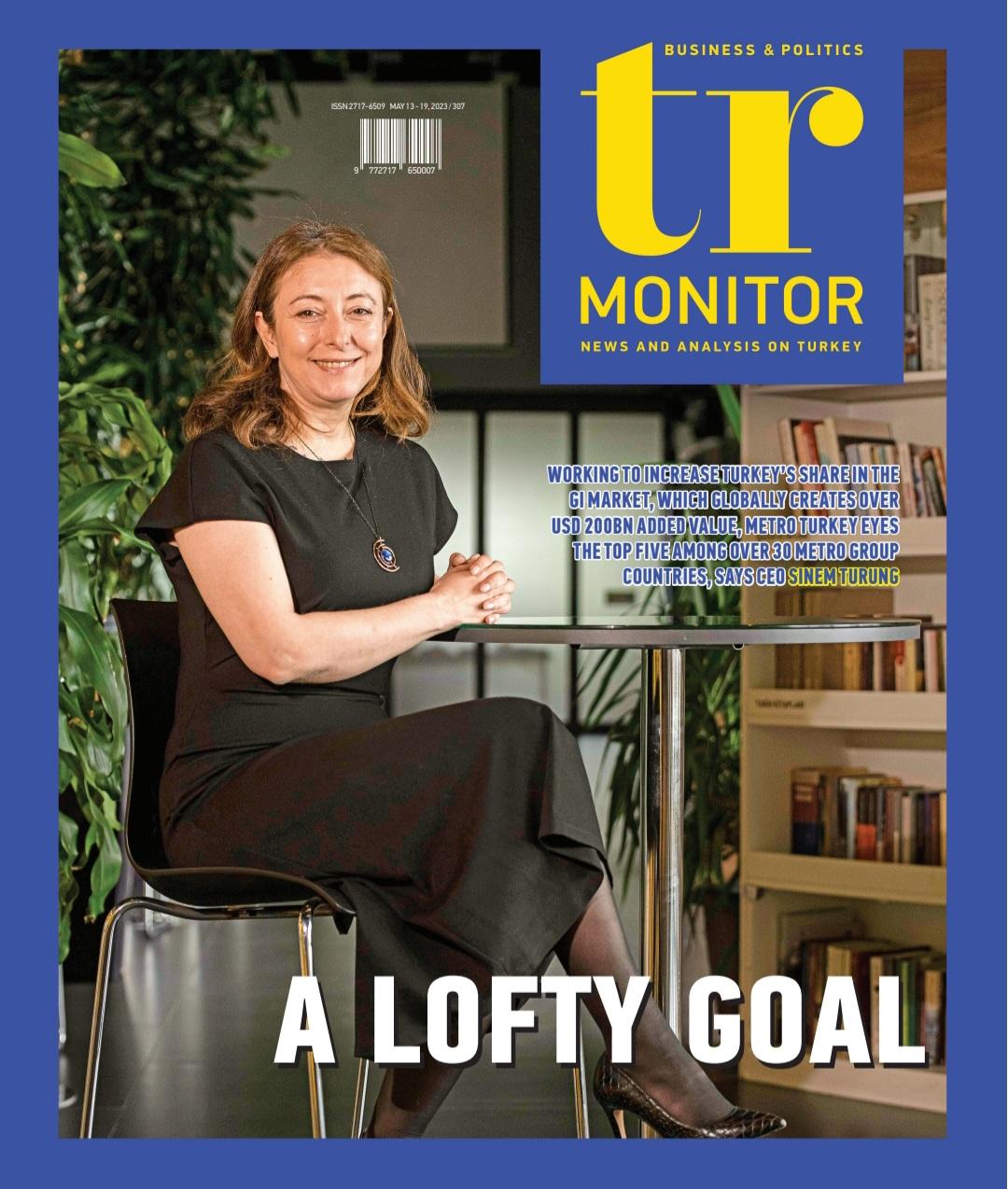BY BESTENIGAR KARA
Metro Turkey, which is the subsidiary of the German international retailer Metro Group, aims to be among the top five largest affiliates in the firm’s global operations, according to Sinem Turung, CEO of Metro Turkey. “Turkey is among the top 10 countries in the company’s global operations in terms of size. Our goal is to rise in this ranking to the top five as Turkey has enormous potential on the end consumer and HORECA sides,” Turung said in an exclusive interview with TR MONITOR.
Founded in 1964, Metro AG currently operates in more than 30 countries. The group entered Turkey in 1990 as the first international retailer investing in the country. “We celebrated our 30th anniversary in Turkey in 2020. We have supported the HORECA and agriculture industries, production and producers and contributed to their development for a long time,” Turung noted. The company has 37 stores and employs over 4,000 people in Turkey. “However, we reach 70 cities from 37 locations through our Metro Gastro service, FSD (Food Service Delivery) operations, and deliveries to the HORECA sector. That’s a big advantage for us,” Turung added.
Metro Turkey is only responsible for Metro Group Turkey operations but no other regions. “That’s why we set a lofty goal to protect the values of Turkish cuisine, to transfer its tastes to future generations, to support, preserve and raise awareness of our products and chefs. Although we are responsible for Turkey alone, our efforts support global promotion of the Turkish culinary.”
The company continuously raised its market share in Turkey since 2015. It has always focused on growth-driven strategies and implemented sales and profitability growth policies in the country. As Turung says, Metro Turkey is among the Metro Group subsidiaries with the highest growth potential in the HORECA sector. “Considering the distribution of the HORECA sector across the country, 70% of enterprises are located in the Aegean and Mediterranean regions from Canakkale to Mersin, in addition to Istanbul and the capital Ankara,” Turung noted, stressing that Turkey has a large geography. “Our tourism industry shouldn’t be limited to coastal tourism. We also have cities such as Gaziantep and Hatay, which have already earned a reputation in gastronomy. We have a value like Cappadocia near Kayseri. That’s why there are many fields where Turkish tourism can progress. Gastronomy, an important factor from this perspective, shows a big potential for the HORECA sector.”
Metro Turkey prioritizes meeting all kitchen needs, while the HORECA sector is among the most important customer groups for the company. “The goal is not only to meet their needs but also to offer innovative products through which they can create a difference. Our home brand products are important for us at this point,” Turung said, stressing that there is a hike in demand for home brand products in the world. From this perspective, Metro Turkey increased the share of homebrand products in the turnover by around 4-4.5 points this year, compared to the previous year. It has nearly 4,000 homebrand products and annually adds around 300-400 home-brand products in its portfolio in line with the demand. “This is also an innovation for us,” Turung noted. Metro Turkey offers these products under different brands, such as Metro Chef, Metro Professional, Metro Premium, RIOBA, or Sigma. Moreover, the locally produced products account for 98% of Metro Turkey’s purchases. “Therefore, the share of local products is high in our total sales,” Turung added.
SUPPORTING GI PRODUCTS SINCE 2012
Metro Turkey places a special emphasis on the products with the geographical indication (GI) as they are important for restaurants and chefs to differentiate their menus and crucial for the sustainability of local products. “We aim for GI products to enter the menus of restaurants, and ensure restaurants differentiate themselves. We support different products in different regions,” Turung said. Within this frame, Metro Turkey kicked off the Metro GI Products project in 2012. It aims to protect the GI products, which grow in unique natural conditions, to promote them nationally and globally, and create value-added for local producers and therefore, the national economy. It also supports the protection of local seeds and the development of local manufacturers. “Turkey has a big potential in GI products thanks to its ecological structure. The country has 3,000 potential GI products alone, while there are only 3,500 GI products in Europe,” Turung noted. “We work for the Turkish economy and producers to take the necessary share from the GI products, which create the value-added of EUR 77.1bn in the European Union (EU) and over USD 200bn in the world,” she added. Taskopru garlic, Aydin fig, and Finike orange are among the products that received GI certificate within the scope of the project. The company also attaches importance to GI products being approved by the EU. “The EU approved just nine products. We strive to increase this figure.”
The Hatay white pumpkin is one of the latest products that Metro Turkey has focused on. The company raised purchases from the region hit by twin quakes on February 6 to support earthquake-victim producers. “The Hatay white pumpkin was among those products. But it didn’t have a GI application. We contributed to preparing its documentation and application process in a period of 1.5-2 months after the earthquake,” Turung noted.
Metro Turkey exports to over 10 countries, including Greece, Germany, Ukraine, and Italy. But the company particularly supports GI product exports. The company exported 20,000 tons of GI products in the last two years. The firm’s exports mainly consist of agricultural products, including fruits and vegetables.
SUSTAINABILITY AT THE HEARTH OF THE BUSINESS
Animal welfare is another important title for Metro Turkey towards sustainability. As part of the Kafessiz Yumurta project, the company has committed to offering cage-free eggs under the Metro Chef brand until the end of 2023 and cage-free eggs on all shelves by 2025. The company has also implemented projects to support sustainable fishing. The ‘Kizina Bak Anasini Al,” and the ‘Palamutlar Nerede?’ projects are among them. “As part of the ‘Kizina Bak Anasini Al’ project, we don’t sell any bluefishes and their derivates if their length is below 20 centimeters. The migratory routes of bonitos restudied with the ‘Palamutlar Nerede?’ project. Thus, we ensured that the spawning periods are determined, and the hunting rules are applied correctly.”
Sinem Turung also said food waste is one of the most important sustainability titles for them as Metro Turkey is a company that aims to support HORECA professionals. “Considering Turkey and the world, one-fourth of the food waste is created at restaurants. If you make a difference there, it’s easy to produce an effect. That’s why we’ve started our food movement from this field,” she added. The company kicked off the Fight Against Food Waste Movement in 2017. Then it prepared a guidebook regarding the fight against food waste in kitchens in collaboration with the Food and Agriculture Organization of the United Nations (FAO) and the Agriculture and Forestry Ministry. It also prepared a sustainable restaurant guidebook. “We realized that there was no institution in Turkey that could define what sustainable restaurant meant,” Turung noted. Metro Turkey established a committee of 15 people consisting of NGOs, universities, and chefs. “The study for the guidebook continued for around a year. Overseas precedents were examined, and we adapted them to Turkey. Then we launched it,” she added.

R&D FOR DIGITALIZATION AND GREEN ENERGY
The R&D studies consist of two legs at Metro Turkey. One of them is digitalization, where most investments are made. Metro Turkey Mobile and Metro Fast are among the best examples of digitalization works, according to Sinem Turung. Metro Fast, which can be accessed in the Metro Turkey Mobile application, is a digital feature that allows customers to make contactless shopping at physical stores, follow special prices, view basket prices instantly, and complete their shopping with online payment without removing products from the basket at the cash desk. “It received a high demand during the pandemic as it is a contactless and self-service feature. It’s a big facilitation for end consumers and professionals,” Turung said. On the Food Service Delivery (FSD) side, Metro Turkey receives all orders online from the HORECA sector. That’s why the company continuously improves this field.
The company also provides support for menu engineering. It helps its customers with menu engineering and raises the profitability of its menus through its digital tools. “We separately train our sales team in this field,” Turung added.
The second leg of R&D studies is investments in green energy. For instance, Metro Turkey has kicked off a project with Zorlu Energy Solutions (ZES). “We have electric vehicle charging stations installed by ZES at 35 of our 37 stores,” Turung said. It has also recently started the deposit collection project. “Our goal is to collect plastic, glass, and metal waste which will become a legal obligation as of the next year. We started the project at our Kozyatagi store.”
MADE-IN-TURKEY SEABASSES AND SEABREAMS TO BE EXPORTED
Metro Turkey has started to grow seabasses and seabreams and offer them under the Metro Premium brand within the scope of the ‘Yedigi Onunde, Yemedigi Yarinda’ project. “We have already grown them under the Metro Chef brand. But we also wanted difference for our customers under the Metro Premium brand,” Turung said. As part of the project, the feed, developed with the Norway-based Skretting, and contains algae oil, is used in seabass and seabream production on an industrial scale for the first time in Turkey. “We grew 400 tons of seabasses and seabreams and saved 500 tons of sea fish. We aim to increase the seabass and seabreams production to 900 tons and double sea fish rescues this year, Turung said stressing that they are in talks to export Metro Premium branded fish to other countries where Metro Group operates.
PROVIDED SUPPORT TO RAISE THE QUAKE˹HIT REGION
Metro Turkey CEO Sinem Turung stated that six stores, including those in Kayseri and Mersin, were adversely affected by twin quakes that jolted southern Turkey on February 6. The company has 900 employees in the quake-hit region. Here is Metro Turkey’s assistance for the quake-hit region:
✓ It opened its stores to earthquake victims. Around 150-200 people were welcomed by stores in provinces such as Adana, Gaziantep, and Diyarbakir.
✓ It operated its stores 24/7 in collaboration with Kizilay and AFAD and supplied the needed food by them.
✓ It also worked with nearly 40 field kitchens. Meal donation for some field kitchens continues.
✓ TRY 2m donation was collected through the ‘Benim Isim Benim Mutfagim’ for four quake-hit restaurants in Ramadan.
✓ Metro Turkey has increased purchases from the quake-hit region.










